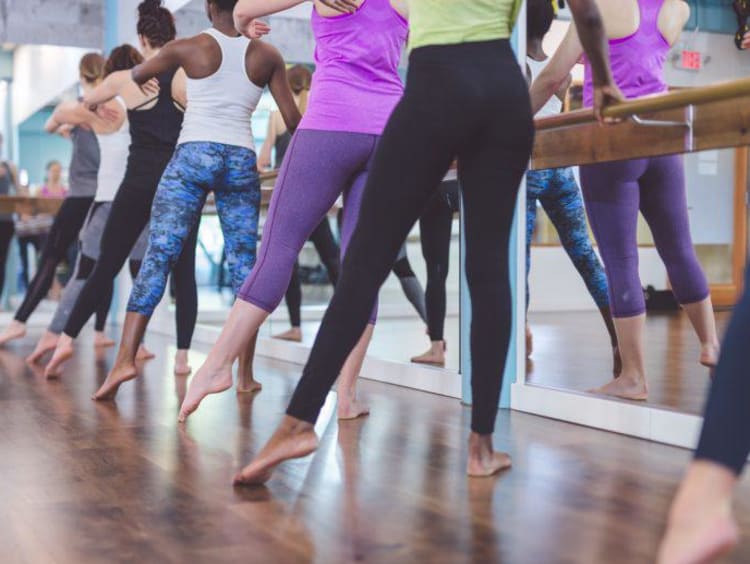A Day in the Life of a Dance Major

Susannah Keita and Julia Geringer
Keita, Director of Dance; Julia, Student, College of Fine Arts and Production
When asked, “What’s your major?” many of our students will cringe with anticipation of the response to being a dance major, usually expecting something along the lines of “Sounds like fun!” or “That must be easy!”
First of all, it is fun! That is not a myth, however, it also happens to be a lot of work. When you walk by the various pools on campus, you’ll see students swimming and laying out, having a grand old time. I can guarantee none of them are dance majors. You’ve probably seen a few dancers walking around campus with a t-shirt that says, “I can’t. I have rehearsal.” The shirt does not lie. Dancers are some of the busiest and hardest working folks you’ll ever meet. Let’s take a look behind the scenes and see what Julia Geringer’s life as a dance major is like:
What’s your major?
I’m a dance performance major.
What does that mean?
Well, it means I’m always in rehearsal, haha! But I’m also leading rehearsal. We have projects in all three levels of choreography and this spring I’ll be collaborating with my classmates on a concert we’re producing on our own! Also, I audition for faculty and guest artists, who create work for our winter and spring concerts. Today’s dancer has to be versatile, so I actually have to keep building my skills in ballet, modern, jazz, tap and hip hop.
What are some of your favorite courses in this degree program?
I’m excited about what’s coming up this year! I’ll have Dance History I and II, Pedagogy, Technology and Dance in Sacred Contexts. So far, though, my favorite has been Choreography because it has helped me grow as an artist. In the class I was able to experiment and find a style that best suits me. The process was super fun, being able to choreograph phrases and present them to my peers to get feedback, I always looked forward to that class.
What’s a typical day in the life of a dance major? How early do you arrive to warm up?
Well, a dance major’s day is certainly a full one. We have early morning technique classes and sometimes classes all throughout the day. I will always try my best to arrive 15 minutes early and start to warm up. This could include some conditioning such as jumping jacks and then some stretching to make sure my muscles are loose and warm.
During any free time we have, we will usually spend it buying food from Lopes Mart, doing homework or working on our own pieces we rehearse and choreograph for the student shows on campus.
How many hours do you spend on homework?
I would say I spend about two hours on homework every night. Even though the classes we take are dance classes, we still write weekly reflections and have essays. The homework we have helps us be able to explain our artistry and has us think about what are things we need to improve upon, along with much more and this is usually on top of homework we have from other classes as well.
What are some of the benefits of being a dance major?
Dancing gives me an emotional release and the freedom to express myself. Many people are stressed out about their classes, but as a dance major, my classes give me an outlet to relieve stress. I think that is one of the major benefits, though another would be that I get to learn about the body and the amazingly rich history of dance.
How do you respond when people say, “It’s great that you’re following your passion, but how are you going to make a living?”
All of us dancers get this question, mostly from friends and family, especially during the holidays. I usually talk about the places I want to audition for, such as Disney and other companies in Los Angeles. Though, I also mention that as a dancer, the skills I have are more than just dance. Dancers are problem solvers, creative thinkers, time managers and team players − things that look good on any resume, no matter the profession.
Personally, I am planning on going into writing as well as dance and I am working on making my own entertainment company. It is hard work and making a living can sometimes be hard, though the entertainment industry is always looking for dancers and many dancers make a living teaching the artist. There are more ways and I’m sure each dancer you ask will have something insightful to say.
You also happen to be the president of our Student Learning Community and SDEO, better known as The Dance Club. What are some of the events you have planned? How do you hope to build on your club traditions?
Yes, well my officers and I have been working hard over the summer coming up with ideas for events. In November, NHSDA or the National Honors Society for Dance Arts has a “Love Your Body” week event. We are talking about making this a potential school event as I believe that everyone, not just dancers can benefit from the messages “Love Your Body” stands for.
We also hold Monday night class every Monday. This is where our Dance and Dance Education students, along with minors, can teach a free dance class to anyone here on GCU campus. It is super fun and we always have a great turn out. As for club traditions, we are working on starting a production team to perform around GCU more and to rebuild our mentor/mentee program, where we pair lowerclassmen with upperclassmen who can help them and mentor them.
Anything else you’d care to share?
There is so much to share about dance and I could probably talk about how amazing it is for ages. Though, I’ll say that I believe that everyone has the right to dance and that anyone can dance, even if it is just tapping your feet or swaying to a beat.
To learn more about the College of Fine Arts and Production, visit our website or use the Request More Information button on this page.
The views and opinions expressed in this article are those of the author’s and do not necessarily reflect the official policy or position of Grand Canyon University. Any sources cited were accurate as of the publish date.


